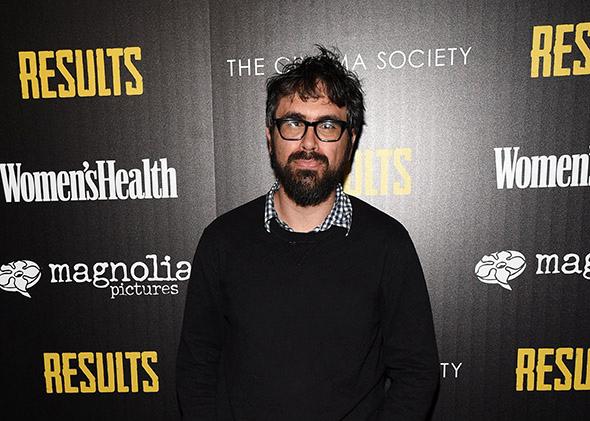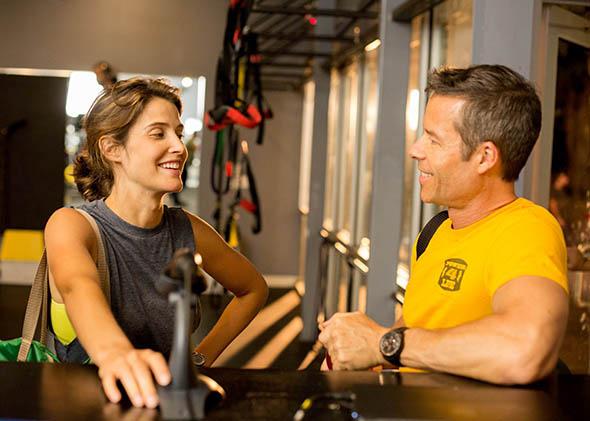In a 2006 review of Mutual Appreciation, the second film from writer/director Andrew Bujalski, Wesley Morris (then the critic for the Boston Globe, now at Grantland) expressed his fear that Bujalski—a maker of finely observed minimalist comedies which, in turn, demand close observation from the viewer—would become a “critic’s pet.” Nine years later, you could argue that’s just what’s happened. Bujalski, who’s often associated with a supposed cinematic movement of the mid-aughts with a name so inaccurate and imprecise I once swore never to use it again in print, is reliably well-reviewed by a majority of critics (though, like any truly original filmmaker, he also has his vociferous detractors). But his movies seldom reach as broad an audience as they deserve.
Oddly enough, it was Bujalski’s least audience-accessible film, Computer Chess (2013), that became his biggest commercial and critical success to date. Set at a programmers’ conference in 1980, Computer Chess was shot on a black-and-white Sony analog video camera from the period, giving it the look of an amateur videotape filmed purely to document the event. (Sometimes the focus will abruptly sharpen a few seconds into a shot, as if whoever’s behind the camera is just figuring out which knob does what—which, according to cinematographer Matthias Grunsky, was sometimes the case on set given the obsolescence of the equipment.) But the apparent artlessness of the film’s early scenes gives way to a subtly constructed multithreaded story about a gathering of people whose intelligence far outranks their social skills. And Computer Chess’ less-than-photogenic form soon reveals itself to be a logical function of its content. How fitting that a film about computer technology in its infancy (the ongoing debate at the 1980 conference is about when a computer will be able to beat a top-ranked human chess player) should be shot on an awkward video camera that’s a contemporary of the clunky machines the programmers wheel through the hotel halls. Marveling at how far both video and digital technology have come in just over three decades makes for an essential part of Computer Chess’ trippy unearthed-from-the-vault effect.
Now Bujalski has released his what’s easily the most audience-accessible of his five films so far, Results, a romantic comedy with, for the first time, a cast made up primarily of familiar actors: Guy Pearce, Cobie Smulders, Giovanni Ribisi, and Kevin Corrigan. (Corrigan isn’t as familiar to most viewers as he ought to be, but we’ll get to that later.) Like Computer Chess, Results explores a very specific professional milieu—here, the world of personal trainers at a high-end Austin gym—and, once again, the look of the film matches its subject matter, as this time the film is shot in photogenic sun-drenched color. The behavior of the characters may not be pretty, but the Texas sunlight spilling over them as they misunderstand and mistreat one another looks sensational.
In the movie’s prologue, the shambling Danny (Corrigan), for reasons unknown, is kicked out and then locked out of the New York apartment he shares with his wife. His failed attempt to pull himself up to a first-floor window ledge to get back in reveals Danny to be incapable of hoisting his own body weight—a moment of masculine humiliation that’s never specifically referenced again, but that informs the whole rest of the movie. As the credits begin, we abruptly shift to a hardcore strength-training class at the Power4Life gym, which belongs to Australian would-be fitness guru Trevor (Pearce). Danny comes in seeking a personal trainer to come to his house. In the time that’s passed since that opening scene (how much? Bujalski never tells us explicitly, letting us put together the timeline as the film goes along), he’s gotten a divorce, unexpectedly inherited a family fortune, and rented a huge, mostly empty McMansion in Austin’s fancy Westlake area. A cranky loner who seems uncomfortable in his own body, Danny has no idea what to do with his newfound money and even less idea what to do with Kat (Smulders), the willowy but hard-driving trainer who soon shows up at his door.
A love triangle of sorts takes shape, with the pudgy, cynical Danny and the ultra-fit Trevor—who seems profoundly convinced by his own TED Talk–ready spiritual jargon—competing for Kat’s attention and favor. But she’s a tough nut to crack, a jock laser-focused on achieving personal excellence for herself and her clients, often at the expense of her own likeability. She instructs Danny to keep a log of everything he eats, and he half-defiantly, half-flirtatiously begins texting her photos of delivery pizza, movie popcorn, and pot pipes packed with weed. (Intoxication, and the disinhibited behavior it permits, is a recurring theme in Bujalski’s work. Computer Chess has a great bar scene in which one programming geek rhapsodizes to another about the special magic of coding on exactly three glasses of Scotch.)
In its second half, Results becomes a movie about business dealings as well as romantic ones. Trevor courts Danny as an investor for his beloved gym, while a mildly sleazy lawyer (Ribisi) joins their circle as an enabler and general hanger-on. Beeswax, Bujalski’s third movie, was almost entirely concerned with the ambiguities of this kind of half-professional, half-personal relationship. It concerns a pair of twin sisters in their late 20s (played by real-life twins and nonprofessional actresses Tilly and Maggie Hatcher), one of whom is facing a lawsuit from the onetime friend with whom she unhappily runs a small clothing business. She contacts an ex (Girls’ Alex Karpovsky) for some free legal advice, and soon finds herself embroiled in a romantic quagmire as sticky as her professional one.

Photo by Bryan Bedder/Getty Images for FIJI Water
A Bujalski movie often has an offbeat editing rhythm, starting and ending scenes a beat or two earlier than expected, as if the viewer has happened upon a world that both pre-existed the movie and will survive it. What we’re seeing, it’s clear, is only one possible temporal slice lifted out of an ongoing life (or, usually, a convergence of previously separate lives). But each film also stands on its own as a complete story. Bujalski’s detractors accuse him of meandering, but his movies are usually much more structured than they at first appear. Some, like Beeswax (which, true to its title, is perhaps the most formless of his films so far) begin and end with matched thematic grace notes. Others, including Results, plant slow-burning gags near the start that take nearly a whole movie to pay off. And unlike Joe Swanberg, another (to me far less interesting) director often associated with the unsayable M-word, Bujalski doesn’t incorporate a lot of on-set improvisation—his naturalistic-sounding but dramatically precise dialogue is generally fully scripted. (With one exception: Computer Chess depended so heavily on its characters’ convincing mastery of 1980s tech jargon that the director hired mainly actors who actually understood what their characters were talking about, and had them ad-lib their lines around a basic structure for each scene.)
Watch Results for its satiric yet loving portrait of three lonely screw-ups who struggle mightily to help one another and themselves become marginally less lonely and screwed up. And watch it, also, for Kevin Corrigan, a superb actor consigned for far too long to minor screen roles as the best friend or the backup thug. Even when the socially inept and self-destructive Danny is at his most abject, Corrigan has a protective inwardness that reminds you he’s keeping a full stock of emotions in reserve: pain, rage, longing, maybe danger. He reminds me of one of those ’70s character actors—a Harry Dean Stanton, a Harvey Keitel—who always seemed permanently off-kilter, not quite at home in either the story or their own skin, and who were thus impossible to take your eyes off, even in lesser roles.
Bujalski’s insecure, rambling protagonists and cerebral attention to matters of cinematic form may not suit every filmgoer’s taste, but he’s only made five features so far, and they’re short enough that it wouldn’t take that long to do an at-home career retrospective. (Before you embark, read this great interview the director gave to Slate upon the release of Computer Chess.) I happened upon Bujalski’s debut film, the 2002 microbudget rom-com Funny Ha Ha, one afternoon on cable a year or so after its release and sat through the whole thing in a state of enchantment. It’s a little slip of a movie, a female coming-of-age tale whose success almost entirely dependent on the considerable charm of its dithering young heroine, played by the winning Kate Dollenmayer (who would later show up in the best scene of Mutual Appreciation).
Something about Funny Ha Ha’s casually mundane dialogue and ambivalently drawn characters seemed so refreshingly un-movielike to me, though it’s a style that, whether because of Bujalski’s work or just alongside it, has now grown much more familiar on big screens and small. These days, creators like Lena Dunham and the Duplass brothers make whole TV series that proceed with similar scripted nonchalance. I committed Bujalski’s name to memory the credits rolled, thinking, the director who made this is going places. And he has, and still is—I just wish more audiences were following him there. Make Results your introduction to his oddball, miniaturist style.
